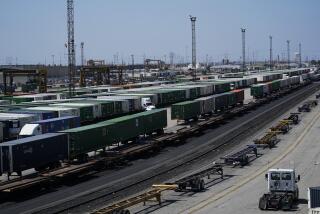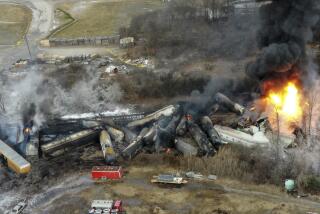Railroad Rules Ban Narcotics, Alcohol on Job
- Share via
WASHINGTON — The government announced federal regulations for the railroad industry Wednesday that prohibit employees from reporting to work drunk or on drugs and ban consumption of alcohol and narcotics while on the job.
The regulations come 12 years after the National Transportation Safety Board, an independent government agency, first called for such rules. There have been a rash of deadly freight train derailments linked to drinking and drugs in recent years.
Transportation Secretary Elizabeth Hanford Dole said that the new rules, which go into effect Nov. 1, “will protect the public and railroad employees from the consequences of on-the-job drug and alcohol use.”
No U.S. Rules in Effect
There are now no federal regulations banning alcohol and drug use by railroad workers. Safety Board Chairman Jim Burnett said earlier this year: “In fact, as far as federal rules are concerned a railroad engineer can consume a bottle of whiskey while at the controls.”
Burnett endorsed the government action Wednesday and said: “The critical test of the success of this rule dealing with drunk or drugged railroaders remains the vigor with which the Federal Railroad Administration will enforce it and the recognition by all levels of the rail industry that rigorous application of the rule is in their self interest.”
The safety rules also require alcohol and drug testing of employees involved in a major accident, authorize toxicological testing of workers when there is reason to suspect impairment and mandate pre-employment drug screening.
Extra Time Allowed
The provisions concerning pre-employment drug screening and post-accident testing will become mandatory March 1 and Dec. 1, 1986, respectively. The government said that the extra time was allowed so railroads can select medical facilities where samples will be collected and make other arrangements.
Unlike other regulated transportation industries, the government did not impose a minimum time period in which workers should abstain from using alcohol and drugs prior to reporting to work.
Since 1975, the Transportation Department has recorded 48 train accidents that were caused by alcohol and drug-impaired workers, resulting in 37 deaths, 80 injuries and $34 million in property damage.
More to Read
Sign up for Essential California
The most important California stories and recommendations in your inbox every morning.
You may occasionally receive promotional content from the Los Angeles Times.












